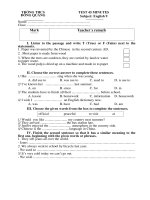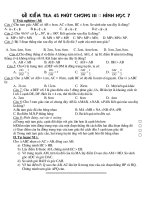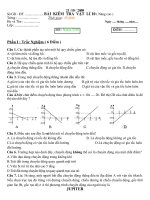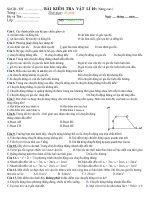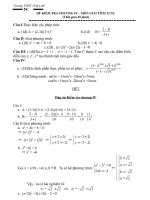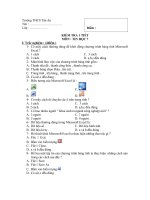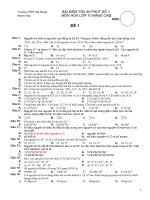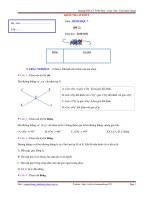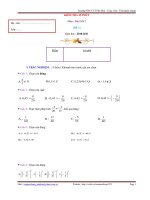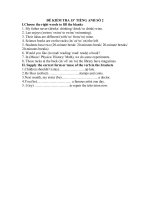- Trang chủ >>
- THPT Quốc Gia >>
- Ngoại Ngữ
KT 45 PHUT SO 7 ANH 9
Bạn đang xem bản rút gọn của tài liệu. Xem và tải ngay bản đầy đủ của tài liệu tại đây (86.93 KB, 8 trang )
<span class='text_page_counter'>(1)</span>KIỂM TRA 45 PHÚT SỐ 7- NĂM HỌC 2012-2103 Môn: TIẾNG ANH - LỚP 9 Thời gian làm bài: 45 phút II. Chọn từ có trọng âm khác với các từ còn lại. (1.5 điểm) 1. A. possession B. property C. industry D. element 2. A. basically B. eminent C. ordinary D. maternal 3. A. shortcoming B. leopard C. kindergarten D. personify 4. A. undoubtedly B. economic C. university D. agricultural 5. A. enthusiasm B. fertilizer.
<span class='text_page_counter'>(2)</span> C. indicator D. socializing 6. A. sincere B. portable C. element D. fortunate I. Chọn đáp án đúng nhất trong A, B, C hoặc D để điền vào chỗ trống. (2 điểm) 1. The water in this glass is ________cold _______ she can’t drink. A. too - to B. from - to C. so - that D. very - for 2. If you want to pass the English tests, you _________ study hard. A. can B. must C. will D. might 3. I saw your company’s __________ on television today. A. advertise B. advertising C. advertiser D. advertisement 4. People often go to that __________ to pray. A. hotel B. shrine.
<span class='text_page_counter'>(3)</span> C. school D. market 5. Before _________ the classroom, you must turn off the lights and close the windows and doors. A. leaving B. leave C. to leave D. leaves 6. My village lies near the _______ of the mountain and by the river. A. leg B. foot C. feet D. legs 7. Lan got up very late, _________ she missed the bus at 7 o’clock in this morning. A. so B. because C. but D. and 8. Many students are afraid of _________ examination in French because they can’t speak it fluently. A. oral B. driving C. short D. written 9. What does he help on the farm ? - He __________ the chickens and collects their eggs. A. takes B. calls C. feeds.
<span class='text_page_counter'>(4)</span> D. helps 10. ______________ we should stop smoking. A. His suggesting that B. He was suggested C. He suggested that D. He is suggested III. Đọc đoạn văn và chọn đáp án đúng điền vào chỗ trống. (1.5 điểm) "Speech is one of the most (1)________ ways of communicating. It consists of far more than just (2)________ noises. To talk or to be understood by other people, we have to master a language, that is, we have to use combinations of sound that (3)________ for a particular object or idea. Communication would be impossible if everyone made up their own language. Learning a language is very important. The basic vocabulary of English is not very large, and only 2,000 words are needed to speak (4)________ quite well. But the more words you know, the more ideas you can express, and the more precise you can be (5)________ their meaning. Words are the main things we use (6)________ what we want to say. The way we say the words (7)________ also very important. One tone of voice can express (8)________ emotions and show whether we are pleased or angry for instance." 1. A. importance B. unimportance C. important D. unimportant 2. A. make B. making C. to make D. makes 3. A. stood B. stands.
<span class='text_page_counter'>(5)</span> C. standing D. stand 4. A. to it B. them C. it D. with them 5. A. for B. of C. in D. about 6. A. expressing B. in expressing C. for express D. to be expressed 7. A. is B. are C. will be D. was 8. A. much B. many C. few.
<span class='text_page_counter'>(6)</span> D. little IV. Chia dạng đúng của từ trong ngoặc. (2 điểm) 1. He was acting in a very. way. (child). 2. You shouldn't have done that! It was very 3. Some of the shanty towns are dreadfully. of you. (think) . (crowd). 4. The team that he supported were able to win the. . (champion). 5. He wants to be a. when he grows up. (mathematics). 6. There were only a. of people at the match. (hand). 7. She had no. of going to see him. (intend). 8. He spent half an hour. himself with the building. (familiar). V. Đọc đoạn văn dưới đây và chọn câu trả lời đúng. (1.5 điểm) Countryside is more beautiful than a town and more pleasant to live in. Many people think so and go to the country for the summer holidays though they cannot live there all the year round. Some have a cottage built in a village so that they can go there whenever they can find the time. English villages are not all alike, but in some ways they are not very different from one another. Almost every village has a church, the round or square tower of which can be seen from many miles around. Surrounding the church is the churchyard, where people are buried. The village green is a wide stretch of grass, and houses or cottages are built round it. Country life is now fairly comfortable and many villages have water brought through pipes into each house. Most villages are so close to some small towns that people can go there to buy what they can’t find in the village shops. 1. When do city people often go to the country? A. At weekends. B. At Christmas. C. All the year round. D. In the summer holidays. 2. What is the advantage of city people when they have a cottage built in the village?.
<span class='text_page_counter'>(7)</span> A. They can have their houses rented. B. They can go to the country at weekends. C. They can go to the country whenever they have spare time. D. They can go to the country in the summer holidays. 3. How are English villages? A. They are all alike. B. They are the same. C. They are totally different. D. They are quite similar, most of them have a church and a village green. 4. What is NOT mentioned in the life of English villages? A. The village green. B. The church. C. Running water. D. The Internet. 5. What can villagers do when their villages are close to small towns? A. They can go there to buy whatever they want. B. They can go there to buy cheaper things. C. They can go there to buy what is not found in the village shops. D. They can go there to buy luxury goods. VI. Chọn câu viết lại đúng nhất với câu cho trước. (1.5 điểm) 1. "My father went here last month", he said. A. He said that his father had gone there the previous month. B. He said that his father went here the month before. C. He said that his father had gone there the month after. D. He said that his father went here the month before. 2. My father said to me: "Why are you late? Did you miss the train?"..
<span class='text_page_counter'>(8)</span> A. My father told me why was I late and did I miss the train. B. My father asked me why was I late and did I miss the train. C. My father told me why I were late and if I miss the train. D. My father asked me why I was late and if I had missed the train. 3. My father said to me: "Be serious!". A. My father said I should be serious. B. My father told me be serious. C. My father said be serious. D. My father asked me to be serious. 4. I said to him: "I’m very angry with you. Go away". A. I said that I am very angry with him and go away. B. I said that I am very angry with him and went away. C. I said that I am very angry and he went away. D. I said that I was very angry with him and told him to go away. 5. "What does she like?" he asked me. A. He asked me what she likes B. He asked me what she liked. C. He asked me what I like D. He asked me what I liked..
<span class='text_page_counter'>(9)</span>
